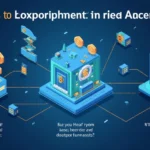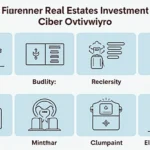Introduction
With more than 14,000% growth in Ethereum‘s value since its inception in 2015, the blockchain space is witnessing an unprecedented transformation in asset ownership, particularly in real estate. The integration of Ethereum into this sector not only enhances transaction efficiency but also introduces innovative governance models that ensure transparency and security.
As of 2023, the global real estate market was valued at over $280 trillion. Given the increased interest in decentralized finance (DeFi) and blockchain technology, the question of governance in real estate through Ethereum becomes pivotal. How can Ethereum’s unique characteristics enable better governance structures in real estate?
This article explores Ethereum real estate governance models, drawing insights from real-world applications and local market conditions such as Vietnam’s burgeoning interest in blockchain technology, highlighted by the 36% increase in local blockchain users in 2023.

The Basics of Ethereum and Real Estate Governance
Before diving into specific governance models, it’s essential to understand Ethereum‘s functions. Ethereum smart contracts are self-executing contracts with the agreement directly written into code. This automation promotes efficacy and reduces the need for intermediaries.
In real estate, governance models can take various forms, such as:
- Decentralized Autonomous Organizations (DAOs): Entities governed by smart contracts where all members can participate in decision-making.
- Tokenized Ownership Structures: Fractional ownership models that allow multiple investors to own a share of a real estate asset.
- Smart Contract-Based Transactions: Direct property sales executed through automated smart contracts enhancing security and reducing closing costs.
Decentralized Autonomous Organizations (DAOs)
DAOs represent an innovative governance model for real estate, allowing stakeholders to influence decision-making processes without centralized control. In a real estate context, this can involve:
- Voting on property management policies.
- Proposing improvements or modifications to properties.
- Determining rent prices and dividends for token holders.
For example, a prominent DAO in real estate is RealT, which allows investors to buy tokenized shares of properties and influence governance. Each token holder can vote on property-related decisions, creating a collective power dynamic that traditional real estate governance lacks.
Tokenized Ownership Structures
Tokenizing real estate assets can significantly lower barriers to entry for investment. This model typically involves the creation of a digital token that represents a fraction of a property, allowing for:
- Accessibility: Investors can engage with high-value assets previously out of reach.
- Diversification: Individuals can invest in multiple properties through fractional ownership.
For example, platforms like Propy have embraced this model, facilitating cross-border property sales and enabling real estate transactions via Ethereum-based contracts.
Smart Contract-Based Transactions
Smart contracts streamline the sale process by automating various tasks such as:
- Verification of Ownership: Automatically ensures that the seller possesses the legal title to the property.
- Handling Escrow: Funds are securely held in escrow until all conditions of the sale are met.
This reduces fraud and ensures that once conditions are fulfilled, the transaction executes instantly. A notable mention is the collaboration between IBM and the NYC Department of Finance, which aims to simplify property transfers using smart contracts.
The Importance of Security and Compliance
As with any technology, the introduction of Ethereum and blockchain into real estate raises concerns regarding security. The keyword tiêu chuẩn an ninh blockchain is not just a trend but a necessity to maintain integrity in governance. Regulatory compliance is paramount, especially in markets like Vietnam, where blockchain technology is rapidly evolving.
Effective governance models must incorporate provisions for:
- Data privacy and protection.
- Transparent auditing of transactions.
- Alignment with local regulations to avoid legal pitfalls.
To ensure compliance and enhance security, regular audits using tools such as MythX can safeguard smart contracts from vulnerabilities.
Case Studies and Real-World Applications
Examining successful implementations provides invaluable insights into Ethereum‘s real estate governance. Consider the following case studies:
- Real Estate Investment Platforms: Platforms like Meridio tokenize real estate, allowing for micro-investments and democratized access.
- Property Management through DAOs: The Centrifuge protocol allows real estate managers to offer property shares in a decentralized manner, significantly reducing administrative overhead.
Vietnam’s Market Growth
The Vietnamese government has demonstrated an increasing interest in blockchain, seeing a surge in users by 36% in 2023. The growth amongst local fintech companies innovating real estate governance is noteworthy. Local initiatives are now exploring the integration of Ethereum to offer:
- Diverse investment opportunities.
- Ease of property transactions through blockchain-based platforms.
This shift signifies a robust acceptance of Ethereum‘s governance models in emerging markets.
Challenges and Considerations
Despite the many advantages of Ethereum in real estate governance, challenges persist:
- Scalability Issues: Ethereum‘s network can experience congestion, complicating high-frequency transactions.
- Legal Recognition: The lack of regulation in certain regions can hinder the adoption of blockchain in property transactions.
Stakeholders must navigate these hurdles to unlock the full potential of Ethereum in real estate governance.
Conclusion
Ethereum presents a transformative opportunity in real estate governance through innovative models like DAOs, tokenization, and smart contracts. As these practices gain traction, they promise to reshape traditional systems, making property transactions more transparent and accessible.
In tandem with technological advancements, regulatory environments must evolve to create frameworks that uphold security standards and economic growth, particularly in markets like Vietnam where adoption is on the rise. The future of Ethereum real estate governance holds immense potential, urging investors to stay informed and adapt.
Not financial advice. Consult local regulators.
For more insights on blockchain applications, visit officialcryptonews.
Author: Dr. Alex Campbell
Dr. Alex Campbell is a blockchain consultant specializing in smart contract audits and has published over 15 papers in notable journals regarding blockchain applications in real estate governance.




